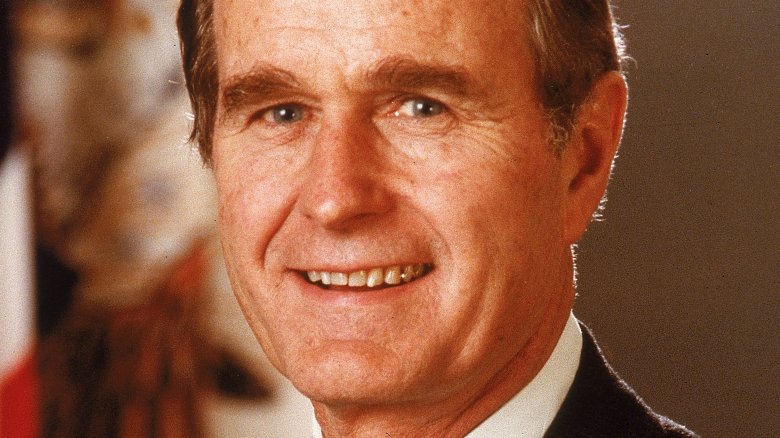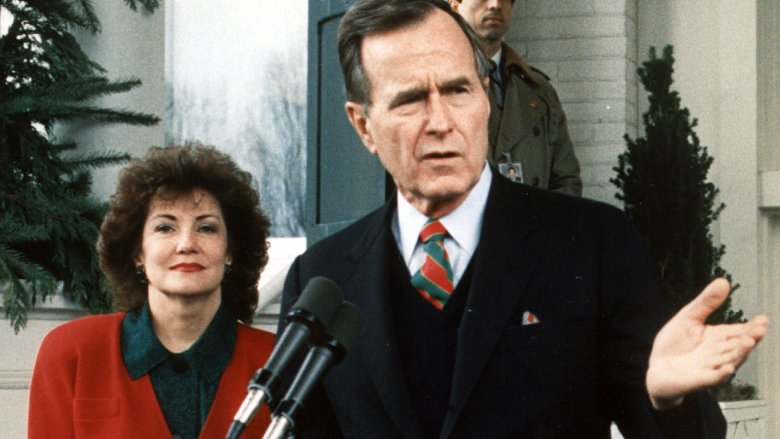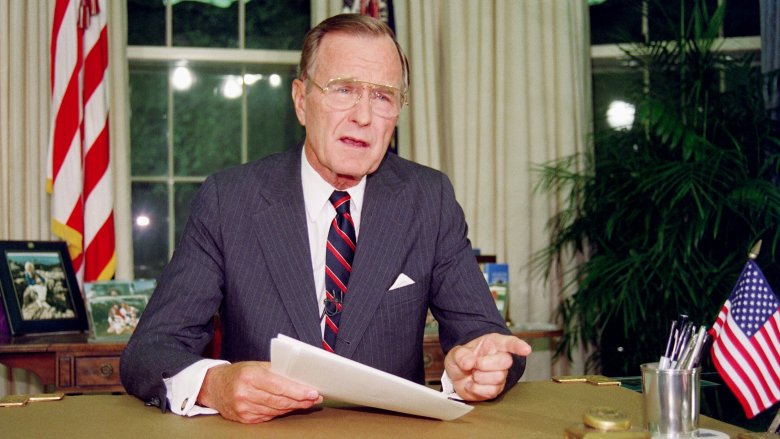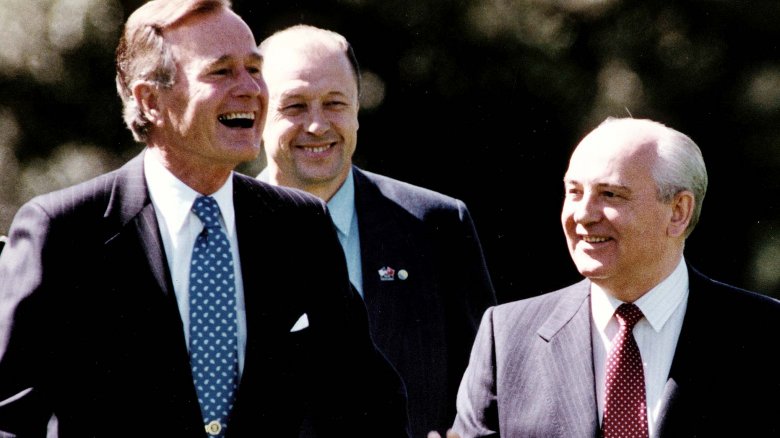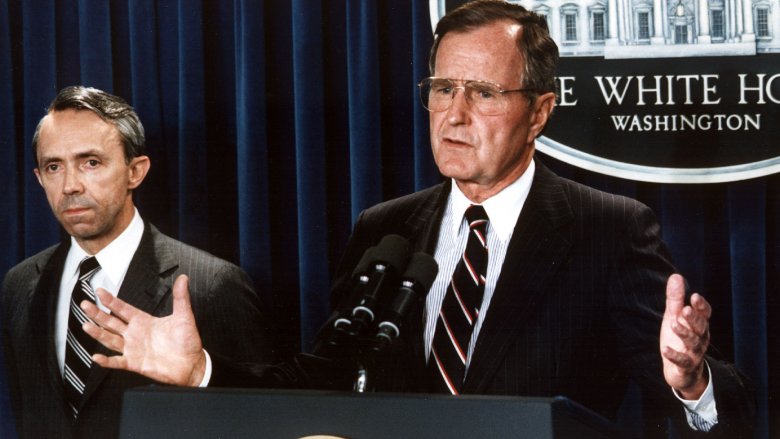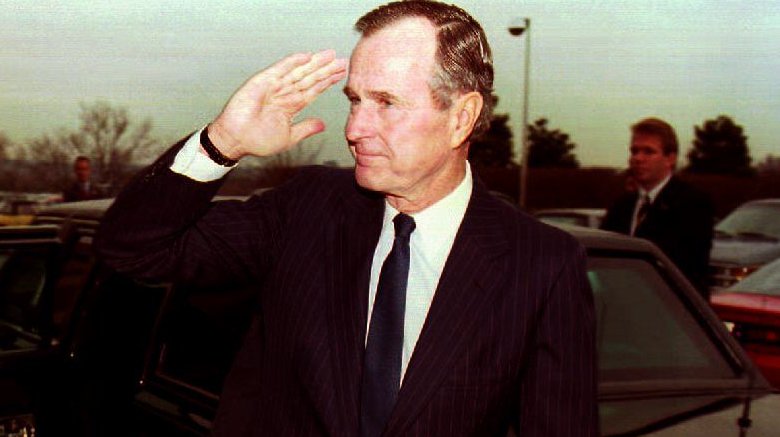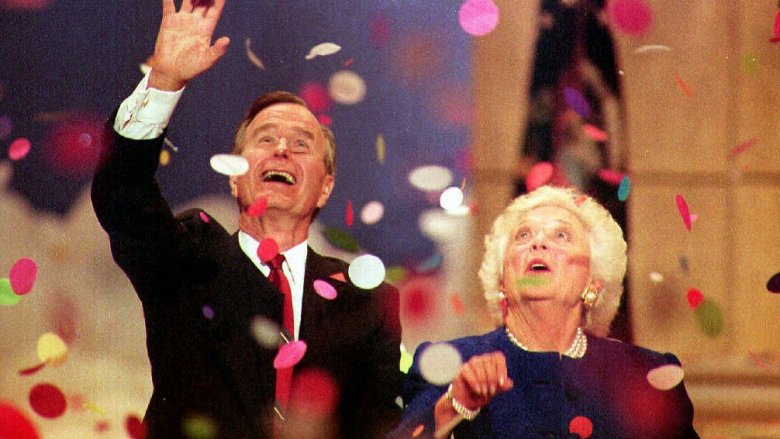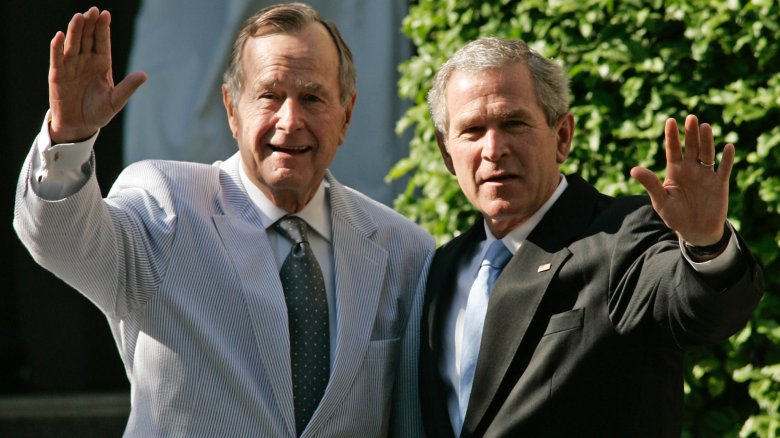The Untold Truth Of George H.W. Bush
Former U.S President George H.W. Bush died Nov. 30, 2018. A few days later, a photo of his service dog Sully, curled up next to his owner's flag-draped casket, appeared on Instagram with the caption "Mission complete." The image denoted the well-lived life of the 41st President of the United States, who was a family man, a decorated war hero, and an Ivy League graduate. His presidency oversaw the end of the Cold War. He led U.S. forces to victory in the Persian Gulf War, gave workplace protections to disabled Americans, and passed legislation that, literally, helped us breathe easier. But most of all, he was known for his kindness.
Bush sought to create a "kinder and gentler nation." However, his empathy wasn't always visible on the surface. Despite his storied resume — from congressman to foreign policy expert – his public persona served as a constant paradox. He was branded a wimp, but volunteered as teenager to serve in World War II, where he parachuted out of a falling fighter jet. He was perceived as ambivalent toward average Americans, but put "comfort the ones I've hurt and let down" on his to-do list following his failed bid for reelection. He called for a New World Order free from terror, but let Saddam Hussein maintain his power. In truth, Bush was human and as paradoxical as most. He hated broccoli and loved his wife. His legacy remains larger than his biggest mistakes.
He banned broccoli on Air Force One
News fatigue is real, but George H.W. Bush's presidency played out during the onset of 24-hour cable news. This was decades before social media gave the president power to broadcast his every whim. As a result, even the most banal aspects of Bush's term became national headlines. The 1990 broccoli ban seemed more like a symptom of the times than actual breaking news. Nonetheless, it came to define Bush, not only as a president, but as an esteemed war veteran who never learned to eat his veggies.
On March 23, 1990, Bush went on record to declare a new national enemy: broccoli. According to a report in The New York Times, the president effectively banned the healthy green from Air Force One. ”I do not like broccoli,” he said (via The New York Times). 'And I haven't liked it since I was a little kid, and my mother made me eat it. And I'm president of the United States, and I'm not going to eat any more broccoli!”
Following Bush's broccoli ban, California farmers sent more than 10,000 pounds of the stuff to the White House. According to C-Span, the event was dubbed "The Broccoli Presentation," and the products were donated to food banks across Washington (though several boxes were also left at the White House for Bush's non-enjoyment).
He refused to gloat about the Berlin Wall
According to The Washington Post, Ronald Reagan's presidency was partially defined by his infamous 1987 quote calling for the unification of East and West Germany: "Mr. Gorbachev, tear down this wall." However, rather than denounce the Soviet Union as an "evil empire" like his predecessor, Bush remained relatively tight-lipped. This perceived aloofness was widely criticized in the press but also allowed him to successfully negotiate with the Soviet Union.
According to Fox News, Bush deeply frustrated his aides when he refused to address the nation following the collapse of the Berlin Wall — and thus the collapse of communism — in Eastern Europe. On that day in 1989, Press Secretary Marlin Fitzwater urged him to give a speech about the "victory of democracy," but instead, he refused to get in front of the camera. "Listen, Marlin," he said (via Fox News). "I'm not going to dance on the Berlin Wall. The last thing I want to do is brag about winning the Cold War, or bringing the wall down."
Bush did eventually close the book on the Cold War after forging a friendship with then-Soviet President Mikhail Gorbachev. By the way, someone did end up dancing on the Berlin Wall. It just wasn't 41. David Hasselhoff got the honor later that year.
Cold War, warm friendship
In today's political climate, it seems almost impossible to believe that the end of a looming threat of nuclear war could spark from a friendly game of horseshoes, but few presidents seem to have approached foreign affairs with the same kindness and understanding as George H.W. Bush. Following his refusal to make a political spectacle of the fall of the Berlin Wall, 41 reached out his hand to then-Soviet President Mikhail Gorbachev and invited him to Camp David.
In 1990, prior to the collapse of the Soviet Union, Bush and Gorbachev managed to forge a friendship while taking turns driving a golf cart (jokingly dubbed "Golf Cart One," according to Fox News) and playing horseshoes. Gorbachev, who was new to the sport, reportedly "got a ringer on his first throw." Bush later "had the horseshoe mounted on a plaque" for the Soviet president as a parting gift. Gorbachev's visit to Camp David marked the beginning of a long friendship, one that, according to The Washington Post, saw Bush sign "two nuclear disarmament agreements with Moscow."
Following Bush's death, Gorbachev praised the former president (per the Associated Press) for his "kindness and simplicity" during a "time of great change."
Watch-Gate failed his public persona
Most people have some part of their job that's boring — even the president of the United States. This was no more apparent than during a 1992 campaign debate where George H.W. Bush ruffled the masses by casually glancing at his watch, anxious to get back to work. By the time Bush geared up for his reelection campaign, he'd already garnered a reputation of being out of touch with voters. While Bill Clinton was playing saxophone on late night TV, Bush was delivering a disastrous MTV News interview. Watch-gate, as innocuous as it may be on the scale of presidential blunders, didn't help change the public's perception. Politico blasted the moment as one of the "8 Biggest Unforced Errors In Debate History."
The town hall-style debate with Bush, Clinton, and Ross Perot was the first of its kind featuring an audience of ordinary Americans. Bush's unfettered reflex aired across America just as he was receiving a loaded question about how the recession personally affected him. So, what was he thinking during that infamous moment? According to Politico, "Only 10 more minutes of this crap" — an honest answer from a president heralded for his honesty. "I did my job as president, I just didn't expose my inner feelings," Bush admitted during a 1999 interview with Larry King, adding, "Maybe, if I'd have been a little more emotional or more revealing of the person, why, maybe it ought to have helped."
He puked on a prime minister
George H.W. Bush is historically remembered for his myriad of achievements — ushering the States out of the Cold War, amending a landmark environmental policy, and becoming a champion for people with disabilities. His victory in the Persian Gulf War garnered him the highest-ever approval ratings in presidential history, only to be broken a generation later by his son. Despite this, one of his less notable achievements is also the one none of us can seem to forget: Bush is the first (and possibly only) president in history to vomit on a Japanese prime minister.
According to Newsweek, Bush was suffering from the flu during a 12-day trip through Asia in 1992. Things came to a head at a Tokyo state dinner, which was dicey from the get-go. After ignoring his doctor's advice, the former president excused himself to vomit during the receiving line. He later fainted between the second and third course before vomiting onto Prime Minister Kiichi Miyazawa's pants. A Secret Service agent heroically caught the ailing president before he fell out of his chair, and with help from Miyazawa, lowered him to safety on the ground. When he awoke, he reportedly uttered, "Roll me under the table until the dinner's over."
The incident was famously parodied on Saturday Night Live, but to be fair, traveling "through 16 time zones in 10 days," and sweating it out in a grueling Tennis match would have been enough to make anyone ill.
And always valued a sentimental, hand-written note
In the age of social media, it's exceedingly easy to reach the masses with a quick 280-character quip on social media. Every day, countless emails are filtered through inboxes and relegated to digital trash bins to be ignored for eternity. But George H.W. Bush, a president once lambasted for his reticence to address the masses on certain matters, reveled in the simplicity of the personalized, handwritten letter.
According to The Washington Post, Bush was "one of the modern era's great letter writers," and no person was too small or unimportant to be on the receiving end of his unique kindness and praise. From foreign leaders, who he regularly congratulated over minor achievements, to his granddaughter ("I am a happy Gampy because you're here") to Frito-Lay ("Sincere thanks for all those pork rinds"). He even penned a letter to a Marine who accidentally dropped his rifle during a parade: "I want to thank you and the others in the platoon for a super performance ... Please thank all involved in the drill."
Bush reportedly spent most of his nights writing thank-you notes, which are outlined in the 700-page memoir All the Best, George Bush. His final note, and the sole message he requested to be etched into his gravestone, self-eulogized the one achievement he wanted to be defined by: "He loved Barbara very much." The pair was married for 73 years. Barbara Bush preceded her husband in death on April 17, 2018.
His last words were 'I love you'
George H.W. Bush was long revered for his family values — from supporting Barbara through depression after the loss of their 3-year-old child, to the very last words ever uttered to his son, former President George W. Bush. According to The New York Times, H.W. Bush had been bedridden for a few days prior to his passing. He was visited by former President Barack Obama and later by James Baker, a former secretary of state. Baker reportedly watched the ailing president enjoy a hearty breakfast of "three five-minute soft-boiled eggs, a favorite, as well as a bowl of yogurt, and two fruit drinks."
"He said, 'Hey, Bake, where are we going today?' and I said, 'Well, jefe, we're going to heaven,' and he said, 'Good. That's where I want to go,'" Baker told CNN (via USA Today). Baker returned later in the day to find his longtime friend and political ally's health rapidly declining. He spent those last hours with H.W. Bush, who was reportedly calling his loved ones to say goodbye. According to The New York Times, his last call was to George W., who told him he'd been "a 'wonderful dad' and that he loved him."
"I love you, too," he replied. Those were his final words.

